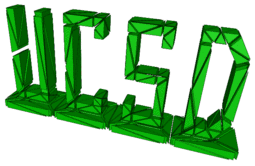| Michael Holst | ||
| https://ccom.ucsd.edu/~mholst/ |
Distinguished Professor of Mathematics and Physics UC San Diego |
|
|
Math 270B (Numerical Approximation and Nonlinear Equations)
Course Topics: Numerical Approximation and Nonlinear Equations Instructor: Prof. Michael Holst (5739 AP&M, mholst@math.ucsd.edu; Office Hours: MW 2-3pm) Term: Winter 2011 Lecture: 12:00a-12:50a MWF, APM 2402 TA: Jonny Serencsa (5720 AP&M, jserencs@math.ucsd.edu; Office Hours: See the TA) Discussion: See the TA Main Class Webpage: http://ccom.ucsd.edu/~mholst/teaching/ucsd/270b_w11/index.html Textbook(s): Numerical Mathematics, Second Edition, by Quateroni, Sacco, and Saleri. Springer-Verlag, New York. CATALOG DESCRIPTION: 270B. Numerical Approximation and Nonlinear Equations (4) Iterative methods for nonlinear systems of equations, Newton’s method. Unconstrained and constrained optimization. The Weierstrass theorem, best uniform approximation, least-squares approximation, orthogonal polynomials. Polynomial interpolation, piecewise polynomial interpolation, piecewise uniform approximation. Numerical differentiation: divided differences, degree of precision. Numerical quadrature: interpolature quadrature, Richardson extrapolation, Romberg Integration, Gaussian quadrature, singular integrals, adaptive quadrature. Prerequisites: Math. 270A or consent of instructor. COURSE INFORMATION: Many of the advances of modern science have been made possible only through the sophisticated use of computer modeling. The mathematical foundation of the computer modeling techniques now used in all areas of mathematics, engineering, and science is known as numerical analysis (sometimes referred to as computational mathematics, numerical mathematics, or scientific computing). The Math 270ABC series at UCSD provides a graduate level overview of some of the foundation topics in numerical analysis. Math 270A deals with various aspects of numerical linear algebra, including direct methods for solving systems of equations involving dense and sparse matrices, iterative methods for solving linear systems, and methods for solving eigenvalue problems. Math 270B focuses on numerical methods for solving nonlinear equations and optimization problems, and on classical and modern approximation theory as needed for analyzing numerical methods. Math 270C concentrates on bringing the tools from 270A and 270B together to develop numerical methods for solving initial value problems (IVPs) and boundary value problems (BVPs) in ordinary differential equations (ODEs). The topics in 270A and the first half of 270B may be viewed as preparation for Math 271ABC (numerical optimization), whereas the topics in the entire series, with emphasis on the topics in the second half of 270B and the topics in 270C, may be viewed as preparation for 272ABC (numerical PDE) and 273ABC (advanced techniques in computational and applied mathematics). Our schedule in Math 270B will be roughly as follows. In weeks 1-3 we will cover iterative methods for solving nonlinear systems of equations, and Newton's method. In weeks 4-6 we will cover methods for unconstrained optimization, and methods for equality-constrained optimization. In weeks 7-10 we will cover classical approximation theory (abstract approximation theory in Hilbert spaces, interpolation of real-valued functions of a single real variable by polynomials, numerical differentiation, and numerical quadrature). We will also discuss briefly some topics in modern approximation theory (wavelets and applied harmonic analysis). GRADES, HOMEWORKS, EXAMS, AND IMPORTANT DATES: Course information, such as any homework assignments given out, exam dates, and so forth, will be maintained on this course webpage. Note that I sometimes make changes to the lecture schedule and homework assignments as the quarter progresses, depending on how far I get each week in the lectures. Therefore, check this webpage regularly. I will periodically (about every three weeks) give out homeworks to help you prepare for the final exam. The last week I will finish any remaining material, and then focus on reviewing the material from the class for the final exam. The final exam will be based on the material I cover in class (a subset of the textbook), supplemented with some background material I will lecture on at the beginning of the course. I will give out some homework problems that will be very similar to problems that will appear on the final exam (and later the qual exam). The TA will be available to help you work the problems as needed. We will collect and mark the homeworks to give you feedback, but your grade for the course will be based only on your final examination at the end of the quarter. The date, time, and location for the final exam will be posted below when the information becomes available.
|
